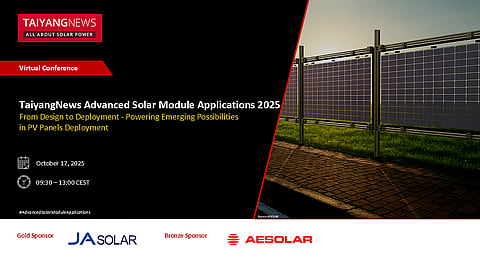China Solar PV News Snippets: TaiyangNews Virtual Conference On Oct 17, 2025 & More
TaiyangNews Advanced Solar Module Applications 2025 Conference on Oct 17, 2025
As the solar industry matures, ‘one-size-fits-all’ no longer holds true for solar modules. Increasingly, products are being designed for the specific requirements of different application scenarios. While the familiar segments of utility, commercial & industrial (C&I), and residential installations remain mainstream, module makers are increasingly refining their bill of materials (BOM) to suit distinct operating environments and customer needs.
The TaiyangNews Advanced Solar Module Applications 2025 Conference brings together industry leaders to explore design innovation in modules that address the needs of solar beyond traditional applications. Join us on October 17, 2025, from 09:30 to 13:00 CEST, as we discuss this year’s theme: From Design to Deployment – Powering Emerging Possibilities in PV Panels Deployment.
Registrations are free and can be done here.
GCL Tech completes fundraising to acquire polysilicon manufacturing assets
Polysilicon producer GCL Tech has announced that it completed a private placement of 2,029,565,000 shares in October, with Infini Global Master Fund subscribing at HKD 1.15 per share. The company had announced its fundraising plans last month (see China Solar PV News Snippets).
This forms the first tranche of the company’s HKD 5.446 billion (~$701 million) fundraising plan announced in September by issuing new shares, with the next round scheduled for November.
According to the latest disclosure, HKD 1.8 billion (~$232 million) of the total proceeds will be used to acquire polysilicon manufacturing assets in China (specific targets undisclosed) to expand its production capacity. HKD 905 million (~$114 million) will be dedicated to production, acquisition, and R&D of silane gas and related materials, including energy storage materials, silicon-carbon anodes, and carbon nanotubes. The remainder of the proceeds will be allocated for capital structure optimization and debt repayment.
Yonz Technology partners with BYD on energy storage
Solar frame and mounting system manufacturer Yonz Technology has announced a partnership with BYD to collaborate on energy storage system development. With this agreement, the 2 companies aim to jointly develop competitive system products for the power storage market.
BYD will provide Yonz with lithium-ion battery systems and complete energy storage solutions. At the same time, Yonz will supply BYD with liquid-cooled aluminum alloy components and other aluminum parts tailored for energy storage applications. The companies also plan to expand their cooperation into the broader renewable energy sector, including solar and wind power.
In September, Yonz Technology’s Research Institute received CNAS accreditation (see China Solar PV News Snippets).
SYP completes TCO glass production line upgrade
Photovoltaic glass manufacturer Shanghai Yaohua Pilkington Glass Group (SYP) announced the completion of the furnace energy-efficiency upgrade and automation renovation of its float glass production line at the Dalian factory in Liaoning Province. The successful re-ignition of this line concludes the project that began in June 2025 to upgrade the core furnace technology and improve automation to enhance its production capability for transparent conductive oxide (TCO) glass substrates. These substrates are used in perovskite and CdTe thin-film solar cells.
Earlier this year, SYP noted that its TCO glass products have been supplied to several perovskite cell manufacturers, including BOE, GCL Perovskite, and Microquanta.
DMEGC Solar reports over 50% YoY growth in 9M 2025 profits
Solar and magnetic material manufacturer DMEGC Solar is expecting strong earnings growth in the first 3 quarters of 2025. According to its earnings forecast, the company expects to post a net profit of RMB 1.39 billion ($194 million) attributable to shareholders from January to September, up 50.1% year-over-year (YoY) from RMB 926.3 million ($129 million) reported in the same period of 2024. For H1 2025, DMEGC reported a net profit growth of 58.94% (see DMEGC Solar Improves H1 2025 Revenues By Over 36% YoY).
The company attributed the growth in its solar PV business to increased PV shipments in both domestic and overseas premium markets, as well as effective cost management achieved through proactive supply chain planning.
Ningxia promotes development of green power direct supply
The Ningxia Hui Autonomous Region has released an implementation guideline to promote the development of green power direct supply projects, effective January 1, 2026. The policy aims to integrate power sources with consumption and raise the share of green electricity usage.
These projects deliver renewable power, such as wind and solar, directly to individual end-users through dedicated transmission lines, either on-grid or off-grid. According to the guidelines, at least 60% of total annual generation must be self-consumed and must account for a minimum of 30% of the consumer’s total electricity usage, rising to over 35% by 2030. The proportion of grid-fed power from such projects is capped at 20% of total available generation.


